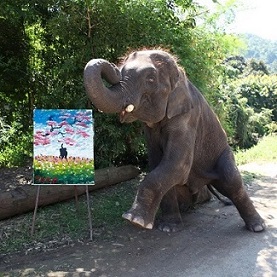
Courtesy of esty.com
The Japanese have a notion in art called wabi-sabi. It espouses the theory that because nature is transient and therefore imperfect, artists should incorporate imperfection in their pieces. Sometimes that flaw may appear as a small asymmetry, a roughness in texture, or austerity in presentation. In my view, wabi-sabi encapsulates the nature of being human.
I’m not sure how the idea applies to animal artists. There are many of their ilk, elephants, donkeys, rabbits, and others, that get paid for their work while their human counterparts stand in unemployment lines. In the case of lesser creatures, does wabi-sabi rule? Do we know if these animals have a concept of perfect and imperfect?
The question became more complicated when Sophia, a robot, sold her first artwork, a self-portrait, for $688,888. Appropriately, she received her fee in NFTs. An NFT is a token with a digital code recorded on blockchain ledgers and which verifies an item’s authenticity and ownership. Sophia’s piece is recorded as Sophia Instantiation. To clarify, instantiation is defined as a concrete example of an abstraction. When Saudi Arabia granted Sophia citizenship, the recognition could be an example of instantiation. Sophia, a computer algorithm, achieves human status. Whether she will be required to wear a burka is another question and one too complex for this humble blog.
Humans continue to best Sophia’s artistic achievement if money counts for anything. The works of Rembrandt and Van Goh command higher prices. Recently, even Mark Roethke sold one of his untiled squares for $31.3 million. Why should I be surprised?. I consider him to be a master of the imperfect.
Looking ahead, to the day when Sophia Instantiation claims a price higher than all the rest, humans have one last line of defense against the robot. A work so valuable might be considered too perfect. In that case, under wabi-sabi rules, it fails. But wait. Would failure prove Sophia is human and legitimately a Saudi Arabian citizen?
Philosophers will have a field day with the question, should it arise. I, however, think the answer is simple. Sophia is a robot. No human programs an invention to fail. Only God is that clever.
